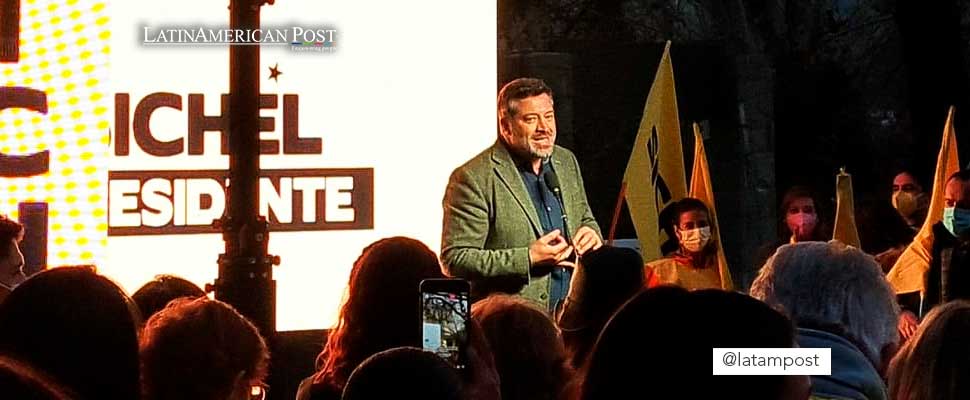Center Right Or Left: the Choice Of the Chilean People
The Chilean Presidential Elections Were Marked By Low Electoral Participation and the Pandemic.

The primary elections in Chile were surprised. Photo: TW-sebastiansichel
LatiAmerican Post | Cristian Camilo Ibargûen Duque
Listen to this article
Leer en español: Centro Derecha o Izquierda: la elección del pueblo chileno
With a surprising result, the lawyer and deputy Gabriel Boric, remained as representative of the Apruebo Dignidad. Boric had a vote of 1,043,495 votes, obtaining a result of 60.41% against the 39.59% of communist mayor Daniel Jadue, getting a difference of 360,000 thousand votes. For his part, the also lawyer and independent, Sebastián Sichel, beat the economist Joaquín Lavín, who represented the UDI (Independent Democratic Union) obtaining a result of 659,549 votes, reflected in 49.08% against 391,700 votes.
Both representatives, in whom the reins of the Chilean executive power will be decided, were born after the dictatorship. In addition, both are quite young for an electoral field, (Boric, 35 years old and Sichel, 43).
Presidential primary results:
According to the Servel (Electoral Service of Chile) more than three million inhabitants went to the polling stations last Sunday, July 18, leaving Boric at the head of the party list. Boric became known within the political spectrum for his participation and leadership during the student protests that began in 2011. He is a graduate of the University of Chile. With this profile, the mayor of Santiaguina de Recoleta, Daniel Jadue, despite being a champion of the communist party since 2012 and being an architect and sociologist, was not a starter in the first round of presidential votes. Before the victory, the already official candidate thanked his contender:
Gracias a quienes hoy han confiado en nosotros. Tomo este triunfo con alegría, humildad y sobre todo con sentido de responsabilidad. Gracias también a @danieljadue con quien he conversado y trabajaremos unidos. Para ganar en noviembre hay que convocar más aún. Seguimos!
– Gabriel Boric Font (@gabrielboric) 19 de julio de 2021
Sichel, who declares himself as a representative of the Center Right, was a member of the Christian Democratic Party (1990 – 2015). He was minister of social development and family of the current government of President Sebastián Piñera, between 2018 and 2019, a lawyer graduated from the Catholic University of Chile. He also served as mayor of the Comuna de los Condes and held the executive vice-presidency of CORFO (Corporación Fomento de la Producción). In his contest to be elected, he not only beat Joaquín Lavín, but also the candidates: Ignacio Briones (Former Finance Minister) who only obtained 119,667 votes and the lawyer and former police officer Mario Desbordes with 123,504 votes.
Also read: The achievements of social protests in Latin America
The presidential candidate, given the optimal results, also tweeted:
Hola. ¿Cómo están? Vengo a agradecer todo el cariño y el apoyo de las 660 mil personas (49%) que votaron por este proyecto colectivo. Gracias por creer en una política que mira hacia el futuro, que construye y dirime sus diferencias en paz, con más y mejor democracia (1/4)
– SichelPresidente (@sebastiansichel) 20 de julio de 2021
'Ahora Chile Vamos' is unified:
Under the premise of "We will work to win in November" with which the presidential Sachiel begins his starting point, he reveals his intention to unify various political sectors of various affiliations (mostly right) to be able to occupy the highest position. To this, he also seeks to add his previous rivals, who, recognizing their defeat, also offered their support for the November elections and that in the event of a tie, they would go to December for the second round. The following parties join this electoral project: UDI (Independent Democratic Union); PRI (Partido Regionalista Independiente Democrático PRI) and EVOPOLI (Political Evolution).
What is Convergencia Social about? :
Under the harangue of “Chile was the cradle of Neoliberalism and this will be its grave.”, Convergencia Social is a party that brings together the main high-impact movements and demands professed by the youth population in Chile. Under the premises of feminism, environmental sustainability and government decentralization; this movement has been the main revelation not only in his country, but at the Latin American level. The other times that the Chilean population has had to go to the polls (with the Presidential Primaries, it was the fifth time) they obtained seven constituents, three mayoralties, 51 councils and are probably seeking to make history with a presidency.




